Housing and support for people seeking safety 2022–2023


Report
IN THIS REPORT
WELCOME LETTER
A word from our Chair of Trustees and Chief Exec
SARAH’S STORY
Growing through Boaz holistic support
SUPPORTING PEOPLE
REFUSED ASYLUM
The impact of safe housing and holistic support

BILEN’S STORY
From isolation to new found confidence
SUPPORTING PEOPLE WITH REFUGEE STATUS
New educational and employment opportunities
FLOATING SUPPORT
Fourishing through new partnerships
BOAZ FILM
Telling one woman’s story through film
WELLBEING AT THE CENTRE

Exploring the five ways to wellbeing
ADVOCACY
Standing against the Illegal Migration Bill
FINANCES
A breakdown of our income and expenditure
Thank you so much for picking up a copy of our Supporter Review! It means a lot to us that you’re reading about the work of Boaz.
In this report, you’ll find updates, news and stories from the past financial year (between 1st April 2022 and 31st March 2023).
We hope that this publication offers some helpful and inspiring insights into the work that we do, as well as providing you with ways you can get involved and take action.
Thank you for your partnership with us to see people who seek safety in the UK welcomed here and free to live life in all its fullness.
Two Boaz Support Workers (Rich & Tsega) prepare for a Drop In Social
3 4-5 6-8 9 10-11 12 13 14-15 16-17 18-19
A welcome letter from our Chair and Chief Executive



Year on year, the environment in which we operate has felt ever more hostileand the past twelve months have been no exception. Against the backdrop of the Illegal Migration Bill, the cost of living crisis and an increase in anti-refugee rhetoric in Parliament, we have continued to provide safe housing and holistic support to people seeking safety in Greater Manchester.
In 2021-22, we spent a significant amount of time speaking out against the Nationality and Borders Bill which passed into law in April 2023. Frustratingly, we then found ourselves spending more time in 2023 opposing the new Illegal Migration Bill, which received Royal Assent, making it an Act of Parliament in July 2023.
Yet, despite this hostile environment and the multifaceted challenges we face, we have much to be thankful for, as this report shows.
Over the past year, we’ve seen our Floating Support work flourish and develop
into a fully fledged Restricted Eligibility Support Service, delivered in partnership with the Booth Centre and Greater Manchester Immigration Aid Unit. This vital work allows us to offer support to a wider range of people who are facing homelessness or at risk of destitution because of their immigration status.
During 2022-23 we have welcomed several new colleagues to the staff team and Board of Trustees, who have brought a diverse range of personal and professional experience to Boaz. We have also said farewell to colleagues, who have moved on from us this year. We are thankful to all those faithful individuals who have served as staff members over the years and who have helped to shape Boaz into the organisation it is today.
This year we have especially appreciated support from Pilotlight, who have helped us to refresh our vision and mission and have supported us through a strategic review which we are in the process of finalising. With demand already rising and set to continue to increase with
policy changes ahead, we are preparing to develop our work so that we can increase our impact in Greater Manchester.
We recognise that we can’t do this work alone. We are grateful for everyone who has supported Boaz this year, showing love and concern whether through giving, praying, volunteering, campaigning, or joining us at Family Night. We want to thank each individual, organisation, funder and partner who we stand with, in solidarity, to end destitution for people seeking safety here in the UK.
Ros Holland Phil Rawlings Chief Executive Chair
P.S. I wonder what happens to this report after you’ve read it? Perhaps, as you read, someone you know comes to mind who might be interested in our work. Why not pass this on to them to spread the word about Boaz?

3
Sarah’s Story
Sarah clearly remembers the day she got the call from Boaz with an offer of accommodation. Disbelief, followed by excitement and relief - it was a moment that would stay with her for a long time afterwards.
“I want to thank God that I received that call,” she shared, remembering the conversation she had with a member of the Boaz team. Sarah had been on our waiting list for some time, but things moved very quickly from this point onwards and she was invited to the Boaz office the next day.
“In the morning, I had to come to the office. I’m shouting when I was given a house. I didn’t believe it.”
Before she came to Boaz, Sarah experienced a period of homelessness after receiving a negative decision on her asylum claim.
“I had a challenge when I was refused by the Home Office. I had nowhere to live. And I had nothing which to do. No finances. I was just confused. And I would think about myself, what am I going to do?”
Government support for someone seeking asylum ends just 21 days after their claim is refused. During this
extremely short period of time, people are faced with stress and uncertainty about where they will go next, as well as the panic caused by the threat of eviction.
Sarah described the experience of living in Home Office accommodation during this period of time: “Every day I was living in fear. And whenever I could hear somebody knocking at my door, I asked myself, ‘Are they coming for me? Are they going to chase me out of the house?’ I was in panic,” she told us.
This was not a place where she felt safe. Sarah’s situation was unstable, and following the withdrawal of government housing and financial support, she found herself destitute.

That’s why the call from Boaz meant so much to Sarah.
Sarah remembers the first time she set foot inside the Boaz house: “When I looked at the house, I looked at the ceiling, I looked at the floor, the bed, I say this is God. And I thank God. And I’m rejoicing - I came to a place and know now I am in a home. A peaceful home. A joyful place.”
At Boaz we believe everyone deserves a safe place to call home. Having a home is so much more than just shelter - it’s the foundation from which people can begin to rebuild their lives.
This is what has happened for Sarah. Since moving into Boaz accommodation, we’ve seen her begin to thrive again.
With the help of Jane, her support worker, Sarah has started volunteering regularly
4
at a community cafe in her local area.
She is on the management committee of a local women’s organisation and is also part of their choir.
As a keen gardener, the outdoor spaces at her shared house are filled with things that grow - pea plants, strawberries, flowers and beans to name a few. But this isn’t a talent she keeps to herself - Sarah helps out regularly at a local community allotment.
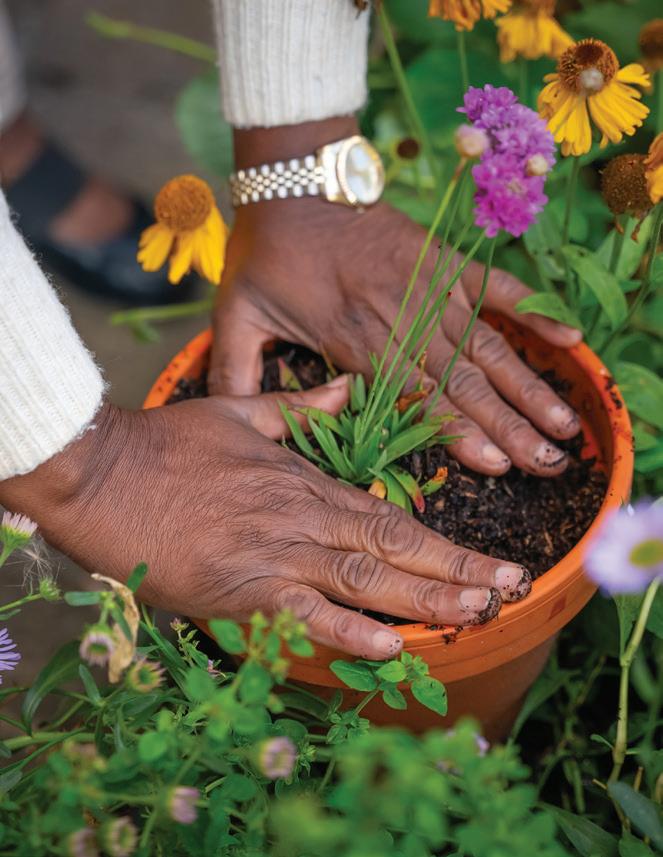
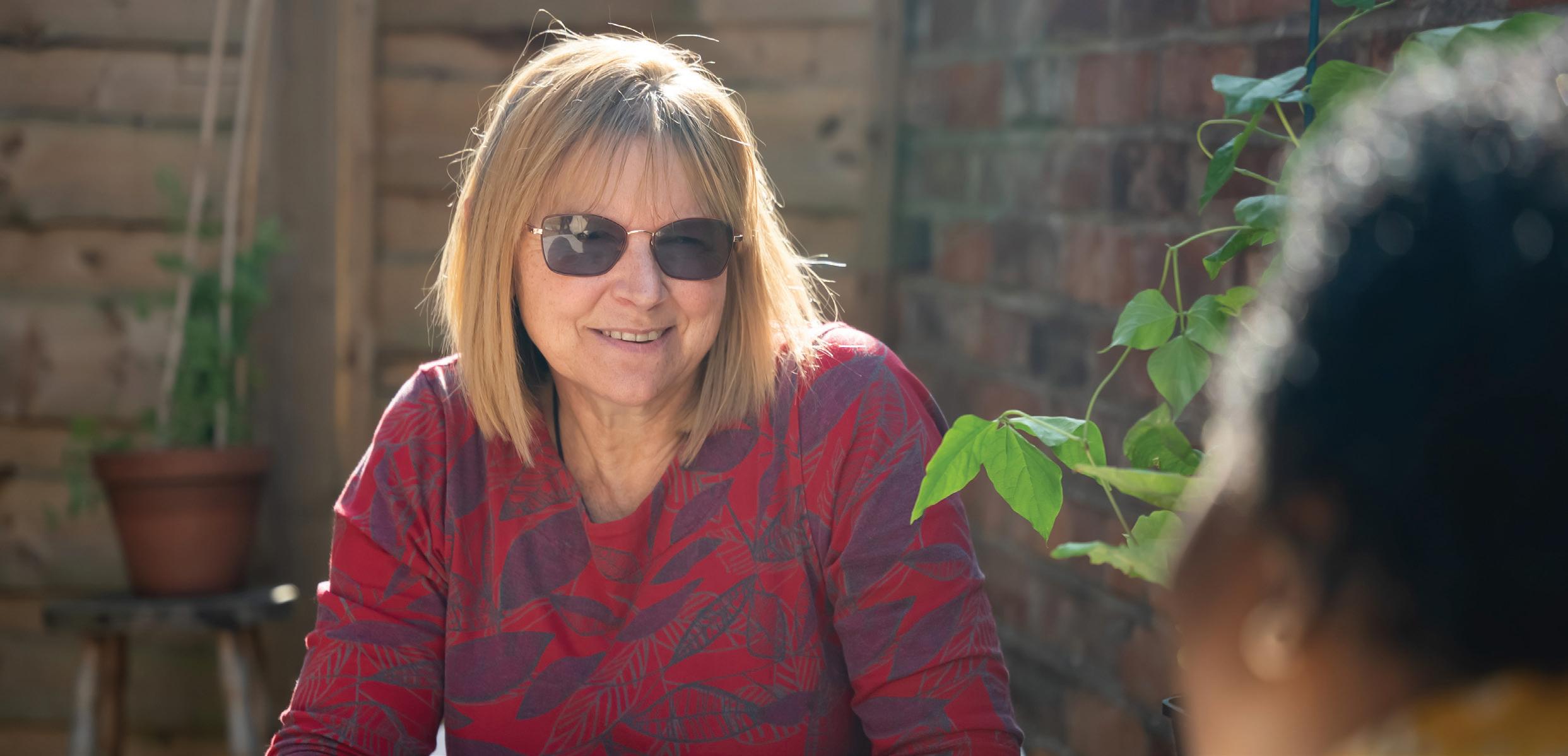
We asked Sarah what difference Boaz has made to her.
“I want to say, Boaz, you have made my life have meaning, you have given me love. You have given me a shelter, where I live, where I sleep, and I have peace. And I could rest, I could pray. I could dance and worship my God. I could pray all the time I want, I could study. I could go out - whatever I have to do, I have the
peace of God. Thank you very, very much. Thank you for what you are doing for us. Thank you for the joy and the love you’re giving us.”
Everyone who lives in Boaz accommodation has access to holistic, 1:1 support from a named support worker.
But Boaz support is so much more than this - it’s about having someone who asks how you are, who genuinely cares, who is on your side and wants to see you grow and flourish.
Sarah described the impact of having a safe place to call home and a dedicated support worker, saying, “You wiped away my tears. Nobody could see my tearsI was crying inside me.”
This means that the people we work with have someone to help them practically with tasks like form filling, attending medical or legal appointments or accessing other services.
 Watch a short film of Sarah’s story by visiting boaztrust.org. uk/grow
Watch a short film of Sarah’s story by visiting boaztrust.org. uk/grow
5
Sarah in her garden with her support worker, Jane
Supporting people refused asylum
During 2022-23 we provided safe and stable accommodation for 56 people whose asylum applications had been refused (35 men, and 21 women).
There are a number of reasons why someone might be refused asylum. In many cases, people may not have a full understanding of the legalities of the asylum system or how to navigate the process. Often, people are unlikely to have had any advice to support them as they negotiate the different stages of what is a complex and confusing process, especially in a second (or third) language.
When people are fleeing war or persecution, it is rarely safe to travel with identification documents, and if people do bring them, they may be lost or stolen on the journey. It is also almost impossible for people to carry hard copies of evidence to prove the persecution they’ve experienced, or the ongoing risks they face, which is needed when they are questioned by the Home Office.
Over the years we’ve seen cases where evidence may be lost after submission
to the Home Office, and where mistakes are made in decision making and communication with people seeking asylum. Finally, due to the often-reported culture of disbelief in the Home Office, even if people feel safe to share their experiences, they are all too often simply not believed.
Following the refusal of an asylum claim, people usually lose their entitlement to asylum support (accommodation and finances provided by the Home Office) after 21 days and are left with no recourse to public funds. People who have been refused asylum are not allowed to work or claim benefits and are frequently left destitute.
Many of the people we work with are terrified of returning to their home countries, for fear of what they might face there. Many want to re-engage with the asylum process to resolve their immigration status.
Providing safe and stable accommodation for people facing homelessness after receiving a negative decision on their asylum claim remains a core focus of our work.
During 2022-23, we received 78 new referrals for people experiencing homelessness after claiming asylum, mostly after their asylum claim had been refused. This is an increase of 15% compared to the previous year but still lower than the years before the Covid-19 pandemic.
This year 22 people who had had their asylum claim refused were able to move on from Boaz to alternative accommodation, with 60% moving on into asylum support accommodation (known as Section 4 or NASS) after making further submissions to the Home Office.
Unusually, four people were able to move on, having been granted Leave to Remain while still living in a Boaz house (3 of them received a decision this financial year, one was at the very end of 2021-22). This meant they were entitled to register for social housing or could access private rented accommodation.
We also supported one person who received temporary Home Office accommodation while waiting to return to their home country. Four people moved on (to stay with
6
friends or in other temporary accommodation) after being with Boaz for more than 12 months.
A reason to celebrate this year has been the fact that a total of 16 people either previously or currently supported by Boaz were granted Leave to Remain!
SHARED HOUSES
Over the course of this year, we managed and supported a total of 20 shared houses (although we returned one house to the owner in late 2022, meaning we now have 19 properties).
Ten of the properties were for people who had become destitute following the refusal of their asylum claims (reduced to nine at the end of the year) and ten were for people who had been granted refugee status. Two of these properties are specifically for people with
PARTNER WITH US
As our waiting lists continue to grow, we’re so aware of the fact that there are many more people in need of somewhere to stay urgently. Looking to the future, we hope to increase our capacity to help more people sooner. If you want to see this happen too, we’d love to invite you to partner with us in the long haul by setting up a regular gift. Find out more at boaztrust.org.uk/give
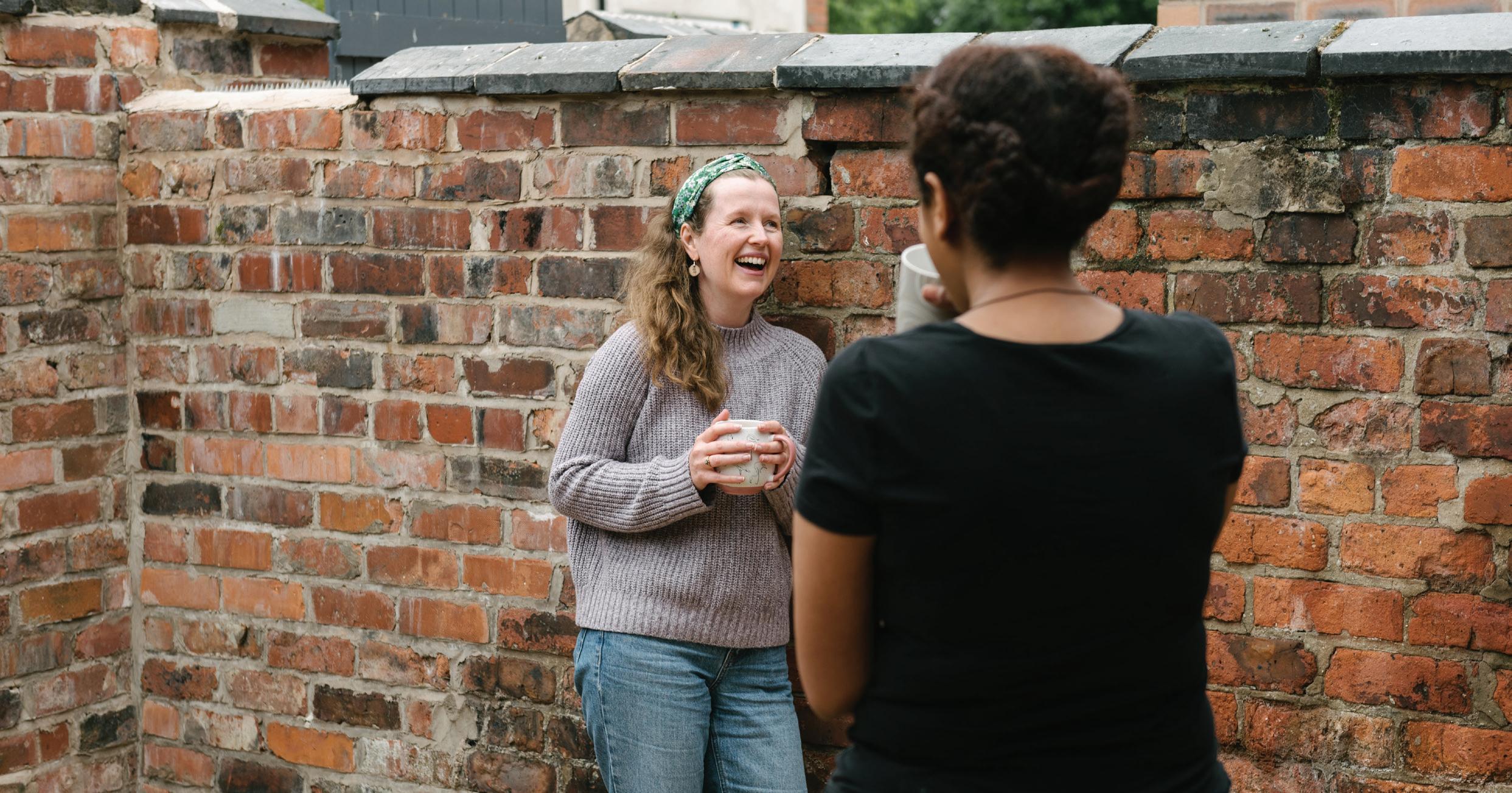
refugee status who have been reunited with family members through the Family Reunion scheme.
The majority of our houses continue to be leased at low cost or peppercorn rent from individual supporters.
Four of our properties are leased from Green Pastures, a Christian organisation working to end homelessness, and two are leased from Arawak Walton, a local housing association.
We had hoped to take on at least one new property this year to replace the one that was handed back, but we were unable to do this, in part due to the rapidly increasing prices across the housing market.
This year, we also saw a lot of hard work on renovation at one of our properties, with both the indoor and outdoor spaces improved and made ready to welcome several new residents.
7
HOLISTIC SUPPORT
While people live in Boaz accommodation, they have a named support worker who meets with them on a regular basis and in the majority of cases, will support them throughout their time with Boaz.
Over the course of this year, we continued to offer people in Boaz accommodation tailored, holistic support, and were pleased to be able to benefit from more in person contact time.
We have supported people to register with their local NHS GP surgery, and access emergency medical care where needed, as well as referring people for mental health support and other specialist services. We’ve also identified opportunities for people to volunteer and attend classes and activities delivered by other organisations.
Wellbeing is an important part of the support offered to people within Boaz accommodation. We offer the opportunity to engage in a range of wellbeing activities, but also keep wellbeing as a focus in individual support meetings and conversations.
Alongside referring people to specialist support where needed, we deliver our

package of support in a trauma-informed way. This is essential due to the range of experiences that people we work with may have survived (in their home countries, on their journeys to safety, as well as in the UK).
Many told us they did not feel welcomed in the UK.

We continued to use pre-payment cards for people living in Boaz accommodation who have been refused asylum. We provided weekly top ups of either £10 or £20 (depending whether someone was receiving support from another local destitution project), reimbursement of bus tickets for certain appointments (with Boaz, medical or legal appointments), as well as an additional £10 once a month instead of the Free Shop that we used to run.
Our support team aims to build trusting relationships with the people we support, and this has been of importance again during 2022-23 as we worked against a backdrop of increasingly hostile and harmful Government policies, including the Nationality and Borders Bill, and the Rwanda offshoring proposal.
We saw these policies and surrounding political rhetoric have a detrimental impact on the wellbeing of people we work with as they feared for their safety and the safety of friends and family here.
We have run four Social Drop In events throughout the year, in line with times of celebration and when we have received a lot of seasonal donations. This year we held these in the Summer, and at Harvest, Christmas and Easter.
We were able to offer people fresh fruit and vegetables as well as tinned and dry goods, gifts (at Christmas and Easter), toiletries, donations of clothing and other one off items. During the Easter Drop In, thanks to some generous donations, we were able to offer a wider range of food items including okra, plantain and dates.
*Name changed
8
Bilen’s* Story
Bilen* moved into a Boaz house after relocating to Manchester from Liverpool. Having been granted refugee status in Liverpool, she moved to be nearer to friends, hoping to find community and reduce the isolation she was experiencing. Bilen has a lot of complex health needs which impact her mental health and wellbeing, and her confidence was very low when we first met her.
When she first moved into a Boaz house, Bilen asked for help with her benefits and was supported to update her Universal Credit with the housing cost. As well as accompanying her to her first Jobcentre appointment, Bilen’s support worker also helped her to obtain and report her sick note on her Universal Credit account every month.

Due to her health needs, Bilen was unable to look for work, so Boaz supported her with applying for a Work Capability Assessment by arranging appointments with a specialist benefit advisor. We also supported her to start the process of applying for Personal Independent Payment. Understandably, Bilen’s health was a priority for her, so we supported
her to arrange and attend appointments with her GP and at a Manchester hospital.
Bilen wanted to improve her English and access education, so she initially started attending ESOL (English Speakers of Other Languages) classes at local organisations near her home. With the help of her support worker, she went on to apply for an ESOL course at Manchester College, where she is currently studying. Boaz also supported her with finding volunteering opportunities at a local partner organisation, where she has been volunteering in their charity shop.
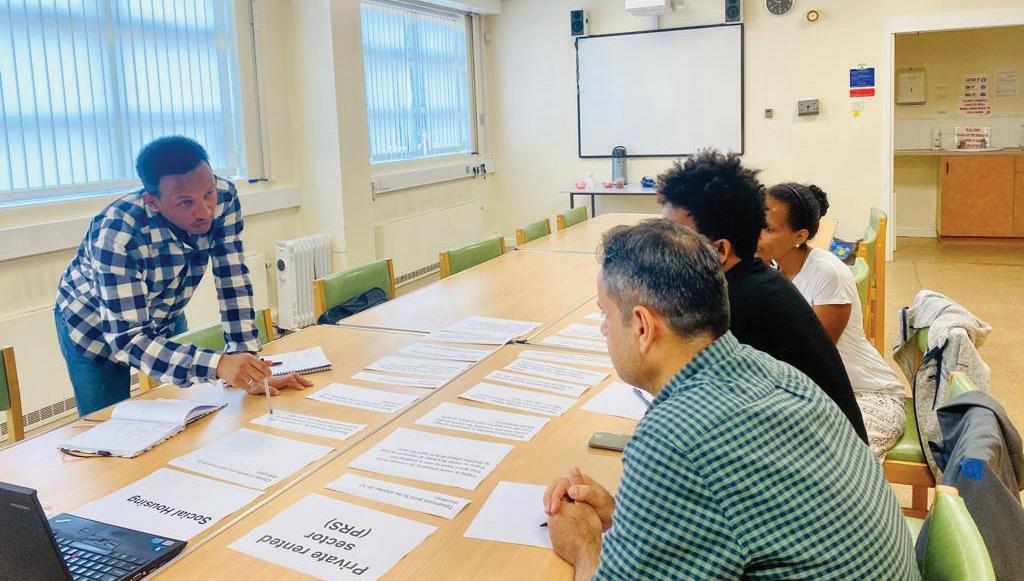
When Bilen first came to Boaz, she needed a lot of support with accessing medical care, educational opportunities and the financial support she was eligible for. But since moving into a Boaz house, Bilen’s
confidence, independence and fluency in English has greatly improved.
Recently, Bilen travelled overseas to visit her husband after a long period of separation. She plans to start a Family Reunion application for her husband to join her in the UK.
*Name changed
9
Supporting people with refugee status
When someone receives a positive decision on their asylum claim, and is granted refugee status, they have just 28 days to find new accommodation and move out of their Home Office asylum support housing.
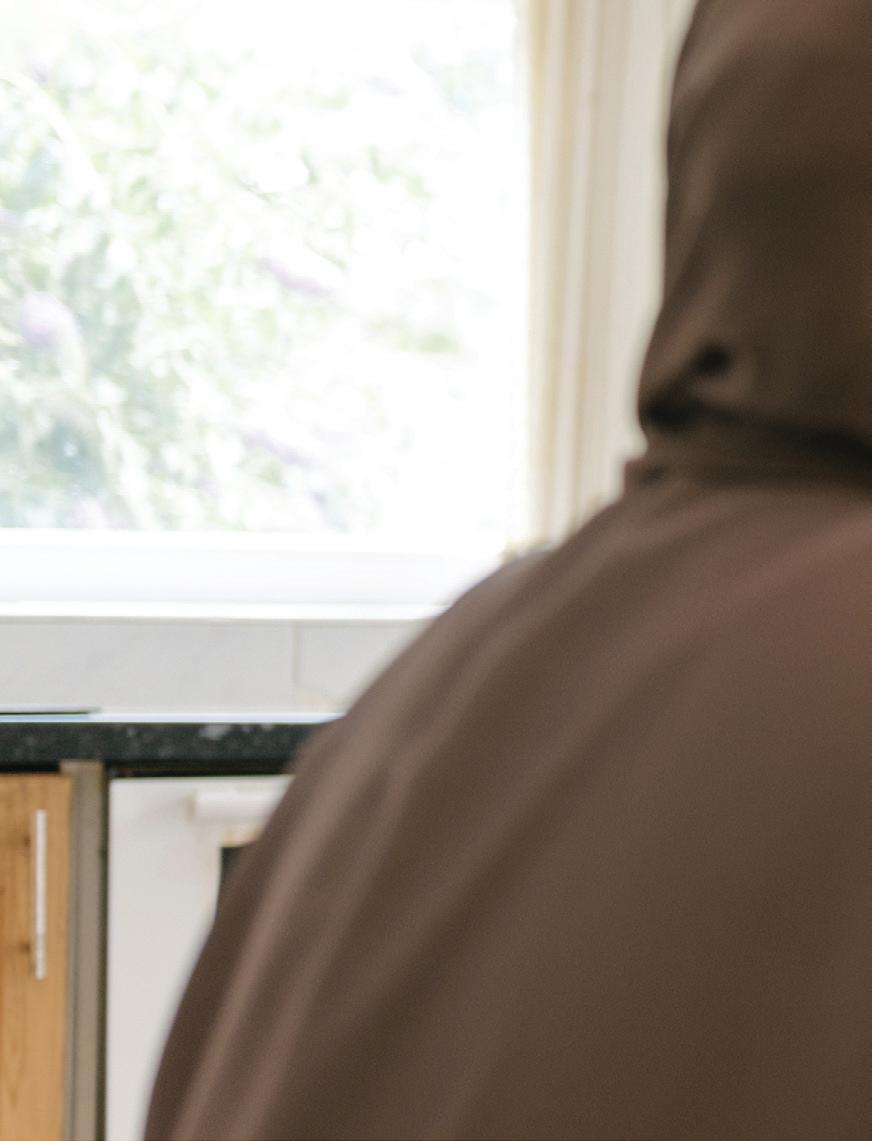
In the middle of a housing crisis, it is highly unlikely that healthy single adults will be prioritised for social housing. And so, after receiving the good news they had waited so long for, we’re seeing people once again at risk of destitution.
People seeking asylum are unable to work or claim benefits, which means generally once they have a positive decision and need to find accommodation, they don’t have money for a deposit, or funds to buy furniture, carpets, curtains and other furnishings. They won’t have a renting history, references for landlords and neither a bank account nor a credit history.
Many newly granted refugees are able to find somewhere to stay when they are first granted status, however this initial accommodation is not always sustainable. If they
are staying with friends or family members, this may not be desirable or possible in the longer term. If they are able to secure a tenancy with a social or private landlord, it can be challenging to maintain this and live well in rented accommodation with no experience of renting in the UK, limited finances, and a small (and potentially nonexistent) support network.
with housing associations, other temporary accommodation (either a hostel, or emergency temporary accommodation through the council), or to stay with friends and family either locally or after relocating within the UK.
In 2022-2023 we have provided accommodation for 45 people with refugee status through our shared houses (23 men, and 22 women).
During the year, 18 people with refugee status were supported to move on from Boaz, to: their own tenancies

Going forward we have planned to re-launch Renting Ready training sessions for people in Boaz houses who are interested in moving into private rented accommodation or who have been waiting to get an offer of social housing. The training will cover understanding tenancies and how to sustain them, rights and responsibilities of tenant and landlord, how to search for houses, and local charities and organisations that provide ongoing housing advice and support.
Support for people who have been granted refugee status can look very similar to the support we offer people who have had an asylum claim refused: the support we provide is a holistic and
*Name changed 10
tailored support package according to the priorities, needs and circumstances of the individual. This support starts with initial advice and signposting when someone is referred to the waiting list, and continues as they move into a Boaz house up until they move on from Boaz accommodation.
We contact people on the waiting list to explain about Boaz accommodation and support, and to let them know about the availability of rooms to help manage expectations. While people are waiting for a space in a Boaz house, we provide information via email, text or other messaging apps about other homelessness support and services for people with refugee status.
During 2022-23, we started supporting people on the waiting list further by arranging a face to face meeting at the office to pass on this information about local charities supporting people affected by homelessness, and making
immediate referrals for support where needed (for example, referring into a local organisation who have a project supporting people into the private rented sector). Where someone has an urgent need for accommodation, mainly due to health needs or other vulnerabilities, we advocate for them with the Housing team at their local council.
This may include supporting people to: register with their local GP surgery and other health services, access benefits they are entitled to, complete referrals to specialist organisations, and explore options around education, training, volunteering and employment.
We also offer support around budgeting and managing finances, including supporting people to understand their ongoing rent payments and rights and responsibilities as tenants. The Support Team are in regular contact with people living in Boaz houses, and take actions to support people’s physical and mental wellbeing.

When people feel settled in their Boaz house, we organise goal setting meetings which are led by the people we work with.
This year 17 people started, or continued, paid employment, and 18 people were able to access college, higher education, training or ESOL provision. 4 people volunteered with local organisations.

11
Floating Support
In 2019, we recognised that our waiting list was constantly growing, and there were people on that list who might be eligible for accommodation elsewhere, if they just had access to the right support and information. We started to explore how we could offer support to people who weren’t yet in Boaz accommodation.
This Floating Support model continued to evolve after the closure of the Boaz Night Shelter due to the Covid-19 pandemic in 2020.
Floating Support has since developed beyond the Covid pandemic, and we received specific funding to continue piloting this work until the end of March 2023. We have now received further funding to continue our Floating Support as part of the Greater Manchester Restricted Eligibility Support Service (RESS), working in partnership with the Booth Centre and Greater Manchester Immigration Aid Unit (GMIAU).
The people we support tend to be: sofa surfing or in other unstable accommodation and at risk of destitution, sleeping outside, staying in other emergency and temporary accommodation
(including A Bed Every Night - temporary accommodation provided across Greater Manchester), or staying in our local council-provided cold weather provision.
There is a need for this specialist support to ensure people have access to legal advice and other relevant services. We also support people to access any financial assistance or accommodation they are eligible for. In this way, Boaz Floating Support allows us to help more people, including those who are already on our waiting list for accommodation.
During 2022-23, 75 people were supported through Boaz Floating Support. The primary focus of this work was around people’s legal situation in the UK, and their current insecure immigration status, as well as supporting people to access healthcare and medication.
After an initial assessment, ongoing support work included completing Subject Access Requests for people to access their file from the Home Office (as people had lost paperwork due to moving around), referring people to a local solicitor (through GMIAU) and supporting people with the outcome of those meetings.
At the initial assessment, it sometimes became apparent that people were already eligible for alternative accommodation (asylum support), and so we were able to assist them to access that accommodation.
We now run monthly drop-ins at three partner organisations, for people they are working with who are destitute and would benefit from Boaz Floating Support. As RESS develops, we are hoping to increase the number of drop in sessions we run and expand the number of locations they take place in across Greater Manchester.
This year, 12 people moved into longer term Boaz accommodation, after becoming known to us through Boaz Floating Support.

*Name changed 12
Telling one woman’s story
We know that one of the most powerful ways to help people to engage with and understand the issues faced by people seeking safety in the UK is through sharing stories.
In December 2022 we were excited to launch a new film, co-produced by Aimee* (who was previously supported by Boaz), Amy Merone and Jarek Maciejowski, an independent filmmaker. Aimee speaks powerfully about her experience of destitution and the impact of having somewhere safe to stay.
We launched the film at Family Night in December 2022, via email and on social media. After the film premiered at Family Night, Aimee spoke in person to everyone there.
She described the experience of waiting for years of her life to be granted leave to remain in the UK. Although she has now received her refugee status, Aimee spoke honestly about feelings of regret for what might have been if she hadn’t been left in limbo for such a long time.
She shared how while she was living in a Boaz house, she came to the realisation that despite the struggles
she faced, she still had an opportunity to get out and make a difference. So she started volunteering at a project in her local community.
We were especially moved by feedback from three women who are currently living in one of our shared houses, who told their support worker how well they felt the film reflected the experiences of women who have been forced into destitution.


*Name changed
If you haven’t seen the film yet, you can watch it by scanning the QR code below. We hope you find it encouraging and inspiring.
The film was extremely well received and has helped us to communicate the difference that Boaz makes, as well as the urgent need for the work we do.
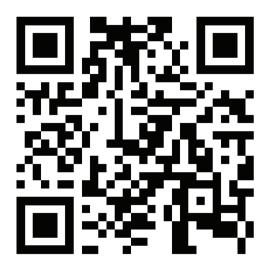
13
We worked with the talented filmmaker, Jarek Maciejowski, to share Aimee’s experience of destitution and the asylum system in the UK.
Wellbeing at the centre
At Boaz, we meet people at what is often a point of crisis, and one of our immediate aims is to seek to reduce the impact of destitution. We work with them to ensure that they are able to meet their basic needs, including food and toiletries, and access to medical and legal support.
From that point, we provide a programme of holistic opportunities to benefit physical and mental wellbeing. During 2022-23 we have run the following wellbeing activities:
• Walk in the Peak District
• Women’s monthly wellbeing walks in a local park
• 4 Social Drop In mornings (providing an opportunity for people to also receive food and donations)
• Trip to RHS Bridgewater
• Monthly women’s wellbeing sessions at our office
• Trip to Manchester Art Gallery
We also provided financial support (reimbursement of bus tickets) for some people who were attending
non-Boaz activities that contributed to improving their wellbeing, where transport costs were not reimbursed.
A highlight during 2023 has been the gathering momentum of our women’s wellbeing sessions, usually held at our office in Hulme.
Now a regular monthly event, these sessions have focused on different themes at key points in the year, for example, marking International Women’s Day in March. At the March session, one of the women shared that it was “so good to be involved in planning future themes and activities.”
In addition to our regular activities, we were also pleased to be able to continue to offer art therapy sessions for one day a week until September 2022. During this time, trainee art therapist, Adi Thorp, held weekly 1:1 therapy sessions with 3 individuals living in Boaz accommodation.

With funding we’d received for our Floating Support work, we were able to pilot some more art therapy sessions for people accessing that service who needed support with their mental health.
We’ve been so encouraged by volunteers and staff members with expertise in relevant areas, who have helped lead aspects of these sessions - from mindfulness and collaborative artwork, to focusing on movement and simple physical exercises.
Initially, these were weekly open group sessions which saw 2-3 people attending each week. This later evolved into weekly 1:1 sessions for one person, who particularly engaged with the reflective and often non-verbal approach of art therapy. Everyone who participated in art therapy sessions has given really positive feedback.
14
“When we come there is something that you feel, are loved, are not - Sarah
A Boaz support worker chats to someone she works with about our women’s wellbeing sessions

come here, something feel, that you loved, that you alone.” Sarah
Speaking truth to power
At the start of this year, the Nationality and Borders Bill passed into law and, at around the same time, the Government began its concerted efforts to send single people seeking asylum to Rwanda, irrespective of where they came from.
Over the course of this year, we have continued to write and release statements opposing these Government policies. We spoke out about the Nationality and Borders Bill, the Rwanda offshoring proposal, the situation in Ukraine and more.
Standing with more than 200 organisations as part of the Together With Refugees Coalition, we’ve been part of some powerful and creative displays of support for refugees this year.
Building on the media connections we developed last year, we had the opportunity to take part in Granada Debates (a local news and current affairs television programme) after the first Rwanda flight was halted.
This provided an opportunity for our Advocacy and Communications Manager, Amy Merone, to explain to viewers how the proposals not only showed a complete
disregard for the 1951 UN Convention on Refugees, but they were also completely unworkable and would be at huge cost to the UK taxpayer.
letters to our MPs and signed joint statements, letters and petitions with hundreds of other organisations.
This cruel legislation effectively amounts to an asylum ban and will see anyone arriving in the UK in a small boat denied the right to claim asylum. They will also be banned from re-entering the country or seeking British citizenship in the future.
The Refugee Council has estimated that as a result of the Illegal Migration Act, somewhere in the region of 200,000 people could be ‘locked up’ at a cost of between £8.7-9.6 billion.
As an organisation that longs to see an end to destitution, this fills us with anger, but also with a new resolve to resist this legislation and show

Later in the year we also took part in a local news programme segment relating to the 28-day moveon period for new refugees, which leads to many people experiencing homelessness after their asylum support stops.
In early 2023, the Government announced the new Illegal Migration Bill, which has now passed into law, becoming the Illegal Migration Act. Since this new Bill was announced, we have once again written

16
compassion to the people who will suffer because of it.
Importantly, we need to recognise how much more difficult and frightening this is for friends, colleagues and people we support who are already here in the UK having fled for their lives. What does yet more hostile legislation say to them about our country?
But in the midst of despair, we have hope, and this is what drives us to continue speaking out for justice.
As a faith-based organisation, rooted in the teachings of Jesus, hope is important to us. It’s a fundamental part of our ethos and how we approach our work. The hope we hold onto isn’t just wishful thinking or vague optimism. It finds its home in concrete evidence.
As we continued to develop our new strategic plan towards the end of 202223, we were reminded
strongly of the importance of speaking out against injustice in the asylum system, as well as one of our organisational values - being restless for justice.

Advocacy, campaigning, and working to bring about meaningful system change with and for people seeking safety is therefore going to be a core focus of our work in the years ahead.
If you’re looking for some simple actions you can take to stand with people seeking safety in the UK, find five ways to speak out at boaztrust.org.uk/speak-out
Or, perhaps your school, group or church would like to hear more in person. Book a speaker at boaztrust.org.uk/ book-a-speaker
CONSOLIDATING LOCAL & NATIONAL PARTNERSHIPS
This year, we have continued to work strategically alongside partner organisations and networks - both in terms of advocacy and service delivery.
Local to Manchester, we’ve really valued working together with GMIAU (Greater Manchester Immigration Aid Unit) and The Booth Centre to deliver the new Restricted Eligibilty Support Service.
Nationally, we’re grateful to be a member of the NACCOM network (the No Accommodation Network), as well as the Together with Refugees coalition. Through these networks we’ve been able to share experiences and resources, develop materials together, speak out and learn from each other - particularly alongside colleagues who have lived experience of the UK asylum system.
17
Finances
Income | £630,612
Expenditure | £716,411
Grants
Individual donations (including Gift Aid)
Income from refugee houses
Organisations and churches
Fundraising and sponsorship
Other
Fundraising (staff and other costs)
Other staff costs
Running costs (e.g. training, travel, office)
Support work costs
Housing costs
£1,615 £7,265 £23,132 £140,308 £141,648 £316,644 £34,197 £363,761 £73,189 £54,963 £190,391 18
Leave a legacy
By leaving a gift to Boaz in your will, you could create a kinder, more welcoming future for people seeking safety in the UK.
Leaving a legacy is one of the most powerful ways to help people experiencing destitution after claiming asylum. It’s an opportunity to ensure that the housing and support we provide is still there to help many more people who will need it in years to come.
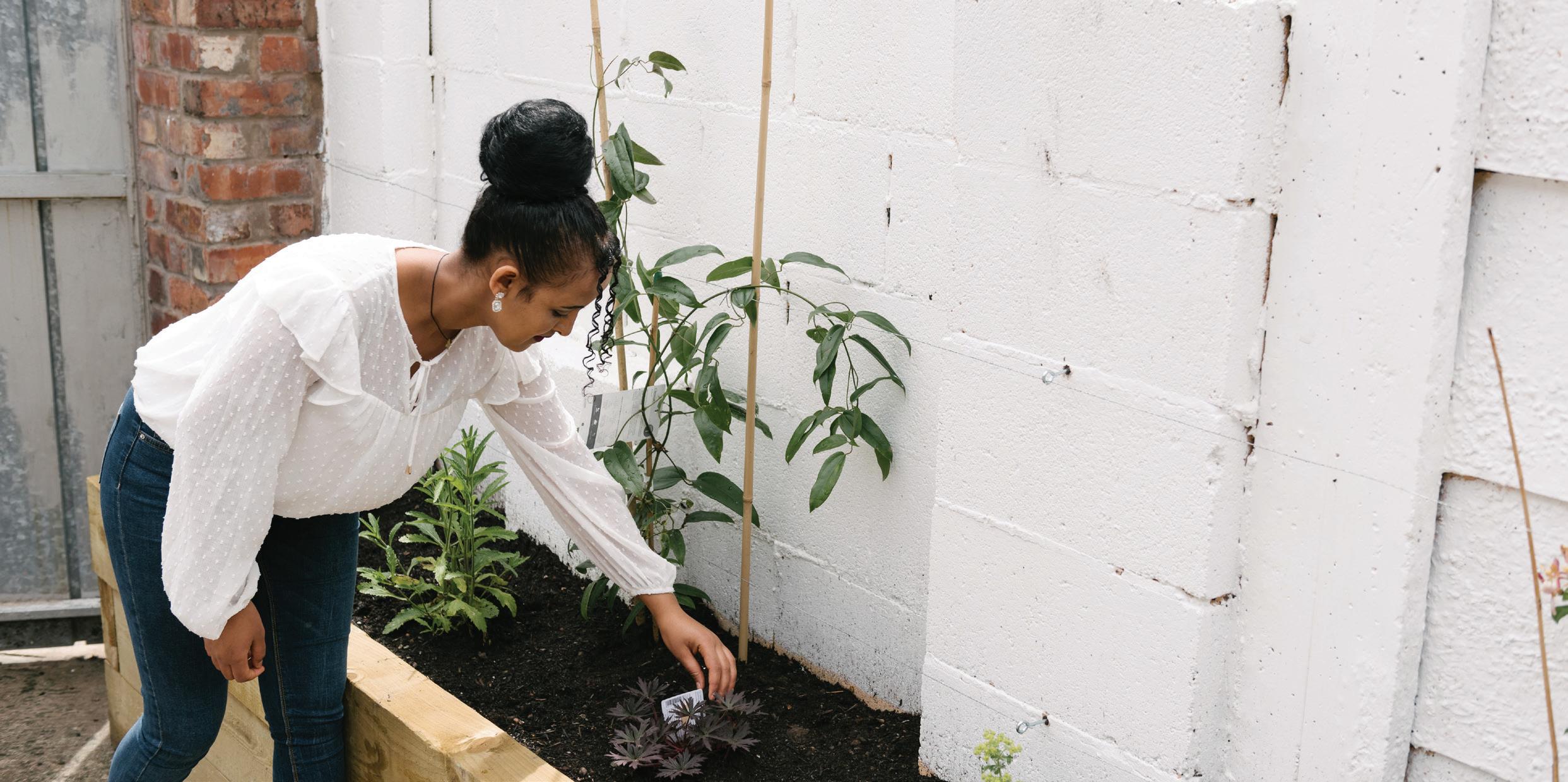
We want to see an end to destitution among people seeking safety in the UK. Sadly, we are unlikely to see changes in the asylum system as quickly as we would like. In fact, rather than getting better, our
country’s asylum policies are on an increasingly hostile trajectory.
We hope for the day when Boaz is no longer needed and people seeking safety in the UK are welcomed here and free to live life in all its fullness. But we’re not there yet. In the meantime, we need resources to help individuals who have been forced into destitution by a system that has been broken for years.
One of our supporters, Sophia*, explained why she is choosing to leave a gift to Boaz in her will.
“I’ve been fortunate to have a good home and safe life. Others have experienced far greater challenges
and suffered traumas that have led them to flee their homes and come to the UK in search of safety and sanctuary. I want my legacy to help those who have lost everything. I want to help them find respite and safe accommodation, and to have hope for the future. The Boaz Trust is exceptional in its care for individuals and I am happy to leave a gift knowing it will be used to make a real difference.”
*Name changed
Together, we can build a future characterised by hospitality instead of hostility. If you’d like to find out more about leaving a legacy, visit boaztrust.org.uk/legacy
19
Stay in touch

This report was written by Ros Holland, Katie Lifford and Kerry Wigglesworth

Photography by Hannah Beatrice, Jarek Maciejowski, Tsega Abreha and Kerry Wigglesworth
Design by Kerry Wiggleworth
This report is printed on recycled paper.

The Boaz Trust Kath Locke Centre 123 Moss Lane East Manchester M15 5DD T 0161 202 1056 E info@boaztrust.org.uk theboaztrust boaztrust
www.boaztrust.org.uk Registered charity in England and Wales no. 1110344












 Watch a short film of Sarah’s story by visiting boaztrust.org. uk/grow
Watch a short film of Sarah’s story by visiting boaztrust.org. uk/grow





















